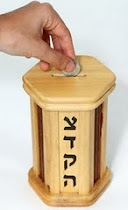Sunday, February 22, 2009
Nothing happens to a Rebbe against his will
0 responses Posted by Yehoishophot Oliver at Sunday, February 22, 2009This is the first of a series of posts concerning the Tzaddik’s control over nature.
When we think about the greatness of my father-in-law, the [Previous] Rebbe, and the fact that he left us ...
I don’t know why Hashem did this, but that is the fact of the situation. This is clearly not against his will, for in the case of a Rebbe the whole concept of “against his will” is not applicable. When the Rebbe agrees to something, he does so because that is what he wants. [The Rebbe said this also to an individual concerning a personal matter, saying:] May Hashem help you to understand that nothing can happen to a Rebbe against his will.
Toras Menachem, Vol. 5, p. 183 .
Labels: powers
Monday, February 2, 2009
Tzaddikim Provide Vital Inspiration
0 responses Posted by Yehoishophot Oliver at Monday, February 02, 2009Some ask, “Why is it necessary to connect to a Tzaddik? I know that the Tzaddik is great, but what could be greater than going to Hashem directly?”
The Rebbe addresses this question in the sicha below:
There is another lesson from the combination of the Parshiyos [Torah portions, sing. Parsha] of Vayakeil and Pekudei. The Parshiyos of Terumah and Tetzaveh describe how Hashem commanded Moshe to construct the Mishkan and its vessels, while the [later] Parshiyos of Vayakeil and Pekudei describe how Moshe told the Jewish people to construct the Mishkan and its vessels, and they implemented this. However, in between these two activities there was something that separated and disturbed this, as described in the Parsha of Ki Sisa [regarding the sin of worshipping the golden calf].
However, when the command was issued by Moshe Rabeinu, as described in the Parsha of Vayakeil, the Mishkan was immediately built and completed. This is one of the ideas represented by the combination of the Parshiyos of Vayakeil and Pekudei.
In most years, Vayakeil and Pekudei are combined, and “we follow the majority.” Even when the evil inclination mixes in and several more days may pass (until the directive as issued via Moshe Rabeinu is carried out), still, nothing else occurs in between. Ultimately every Jew will certainly do Teshuva, but when the matter is revealed via Moshe Rabeinu and “the extension of Moshe in every generation” [Tikkunei Zohar, Tikkun 69, 112a, 114a] this matter will certainly be accomplished, i.e., the Jewish people will certainly perform their divine service, and this will surely bring “the glory of G–d to fill the Mishkan.”
In my own words:
When a command is issued directly from Hashem, the Jewish people don’t necessarily follow through with alacrity. Moreover, they may become sidetracked with trivialities, or even sins. However, when they hear it from Moshe Rabeinu or his extension in every generation, there might be a slight delay, but then they move to carrying out the instruction without going through a stage of sinning.
As is known (for example, see here), the Tzaddikim are “the extension of Moshe in every generation.” Here the Rebbe is saying that knowing that the Mitzvos were commanded by Hashem is insufficient. Bonding with Tzaddikim and receiving their guidance in divine service has a special power to inspire the Jew, protect him from sin, and bring him to perform the Mitzvos with alacrity (see also here).
Subscribe to:
Posts (Atom)








